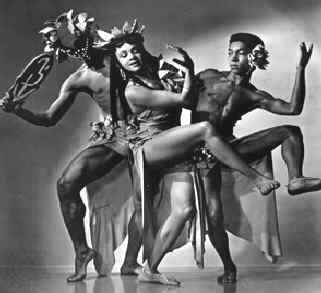

Katherine Dunham was a dancer, choreographer, teacher and anthropologist whose pioneering work introduced much of the black heritage in dance to the stage. In the late 1930’s she founded the nation’s first self-supporting black modern-dance troupe, one that visited more than 50 countries on six continents.
Miss Dunham was a recipient of some of the most prestigious awards in the arts, including the Presidential Medal of the Arts, the Albert Schweitzer Prize (presented at Carnegie Hall), Kennedy Center Honors and decorations from the French and Haitian governments. In her dance technique, Miss Dunham emphasized the isolation of individual parts of the body. Some of her concepts continue to be taught at modern-dance schools across America. Her work was an important influence on Alvin Ailey, among other contemporary choreographers.
Miss Dunham also became attached to Haiti and its culture, first arriving there as a young anthropologist. She later became a priestess of the Vaudun religion. In 1992, at the age of 82 and suffering from arthritis, she staged a much-publicized 47-day hunger strike to protest repatriation of Haitian refugees.
In East St. Louis, she found talented young people living in one of the nation’s most destitute areas and turned them into dancers. Describing her work there, she said her aim was “to make the individual aware of himself and his environment, to create a desire to be alive.”
George Balanchine cast Miss Dunham in a major role in “Cabin in the Sky,” a Broadway musical starring Ethel Waters, which he staged and choreographed in 1940. She then went to Hollywood and danced in and choreographed the movies “Carnival of Rhythm” (1941), “Star-Spangled Rhythm” (1942) and “Stormy Weather” (1943), among others. It was in the 40’s that Miss Dunham developed the fast-paced shows for which she was celebrated. “Tropical Revue,” successfully produced on Broadway in 1943, also toured the nation to much acclaim.
Miss Dunham took her Negro Dance Group to New York in 1937 but did not attract wide attention there until 1939, when she choreographed “Pins and Needles,” a satirical revue produced by the International Ladies Garment Workers Union. In 1945, she founded the Dunham School of Dance and Theater in New York. Until it closed a decade later, it offered courses in dance, acting, psychology, philosophy, music, design and foreign languages.
She also continued to choreograph in New York. In 1963 she became the first African-American to choreograph at the Metropolitan Opera since 1934, startling audiences with her lusty dances for a production of Verdi’s “Aida.”
Her collection of African and Haitian art became the basis for the East St. Louis community’s Katherine Dunham Dynamic Museum, which opened there in the late-1970’s. She also counseled disadvantaged young people, and her colleagues noted that she could calm the angriest of them through the sheer power of her presence, making her ordinarily soft voice even softer — yet always firm — as the counseling session proceeded. Miss Dunham was also the author of many books, some published under the pseudonym Kaye Dunn. Her books including “Journey to Accompong” (1946), “A Touch of Innocence: Memoirs of Childhood” (1959), “Island Possessed” (1969) and “Dances of Haiti” (1984).
